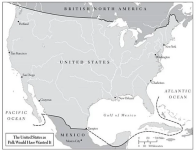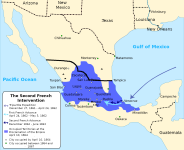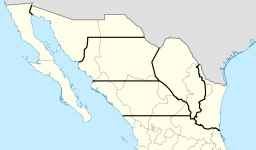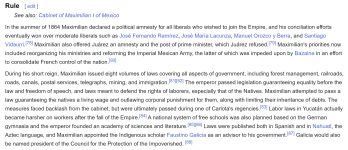Not to criticize OP, but I think the map shown is probably a bit off from what Polk sought. It includes large portions of Durango, Zacatecas, and Sinaloa that I don't recall Polk seeking OTL. Coahuila, Tamaulipas, Nuevo Leone, and a line due west from Coahuila to the Gulf of California (the 25th parallel?) seems more likely.
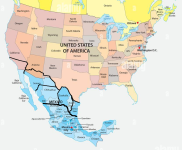
If the Second Mexican Empire is a successful endeavor, I think it would be a very interesting - and dare-I-say successful - polity.
Maximilian is a figure I enjoy learning about, because he seems like a well-intentioned figure screwed over by other forces. He accepted the throne because he was presented with phony referendum results and opinion polls which told him the Mexican people actually wanted him - meaning he was suckered into moving to Mexico. He was brought in by Conservative reactionaries, but actually had very liberal politics that largely aligned with Benito Juarez (and even offered Juarez the Prime Ministership). He supported the formation of a liberal-democratic federation of Central American states. He was brought in by the French, but rebuffed French attempts to annex Sonora for themselves. He signed the Black Decree, but pardoned most of the people who were sentenced to death for it. He adopted the grandson of Agustín de Iturbide - Agustín de Iturbide y Green - as his own son and named Iturbide as successor (which is to say, he did not seek to supplant things in Mexico for the benefit of his own family lineage). He refused to abandon his generals and save his own skin when the opportunity presented itself. And his last words were a hope that his death that Mexico could know peace.
I imagine he would have set up a moderately liberal regime with many of the same policy goals as Juarez, but likely more accommodating of Conservative interests. Liberal reforms could perhaps go through if his regime survives - much to the chagrin of the Conservatives who brought him into the country. The construction of key railroads integrating Mexico City and Veracruz, and extending west to the Pacific, were initiated under Maximillian, for example.
Additionally, the attempted Confederate settlements in Carlota (halfway between Mexico City and Veracruz) and Cuernavaca might be successful. The Americans would loathe these emigre setting up shop in a monarchy on their southern border, but a class of able generals in Mexico with some experience in agricultural development (yes, they're rat-bastard slaveholders) and engineering and logistics (as most generals had at the time) could be a boon for Mexico militarily and economically. Following the fall of the Second French Empire, his country would be able to avoid throw off what French influence remains. Perhaps it would be a place where Bonapartist elites, now removed from power in France, could run off to as well - additionally providing other people who could help develop the country. Mexican history OTL after Juarez is a long line of local elites deciding to invite foreigners in to develop the country. Here, Mexico may perhaps have a cohort of people loyal to Mexico who can develop the country.
